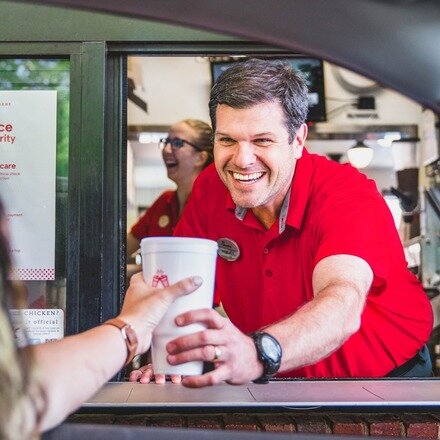What is a franchise?

The franchisee pays a royalty to the license holder for the right to use the name, model and other various business support. This model of business is used by some of the world’s most recognisable and biggest brands.
Having your own business – although operating under another company’s name is one of the best ways to see strong and stable profits (and often faster than start-up businesses). Buying into a franchise also significantly lowers the risk of business failure.
When we think about franchise networks, we often associate them with fast-food restaurants such as McDonald’s or Domino’s pizza. These companies function as franchise icons in the world market. Outside of these franchise giants, there are many more low-key franchise brands available for investment (search our website for opportunities). When buying a franchise license, you are still of course taking a risk in the art of business. However, buying a known brand often brings an initial loyal client base. Also with an established brand recognition you are sure to bring new customers through the door. This gives your business a strong leg-up in the market, reducing the overall risk of going bust.
When establishing a franchise cooperation, both parties sign an agreement imposing mutual obligations to each other. For the duration of the contract, basic obligations of the franchisor involve the licensing of the brand and the transfer of knowledge and support in running the business. On the franchisee’s side, the basic obligation is to comply with the agreed principles set out in the agreement - relevant to the franchise network - as well as paying the agreed franchise fees.
Franchising might come across on the outside simply about selling the rights to a logo and trademark, but in actual fact you’re buying a whole applied business network system. We use the term ‘franchise system’ as the key to understanding the wider business protocols of a franchise. The franchisee counts on the franchisor for systematic development of the business. This includes owner training, staff training, promotional campaigns, sales support and industry know-how, etc.
The franchising game begins when the franchisee pays the franchisor an initial fee which enables the new venture to use their franchise operating license. As per their specific contract terms, from then on either a fee or an agreed percentage of the profits made while operating under said license is paid by the franchisee to the franchisor on a monthly basis. This money is for the licensing, business services and know-how and is often seen to serve all beneficiaries in the franchising network; from market research and new product development to advertising campaigns.
Basic rules of cooperation in the franchise structure
- The franchisor is the owner of the trademark and brand name of the franchise network
- The franchisor has tested the business concept and can demonstrate profitability
- The franchisee is an independent entrepreneur and runs their own business
- The franchisee invests in the fundamentals such as opening the premises and purchasing goods
- The franchisee is the renter/owner the business venue
- The franchisor provides the franchisee with applied knowledge of how to run the business effectively (know-how)
- The franchisee pays for the franchise license and pays a monthly franchise fee for the ongoing know-how business advantages (either directly in the form of set fees or indirectly within the margins of products purchased from the franchisor)
- The franchisee determines the prices of goods and services at their own business site (profits depend on the amount of sales and the level of profit margin)
- The franchisee usually has an influence on type and variety of assortments sold at their business site
- The principles of cooperation between the franchisor and the franchisee are regulated by the franchise agreement and also by the instructions set out in the operating manual.
Franchising is a popular way to start a new business. No matter your budget, if you have an entrepreneurial spirit there is something for you. For as little as a thousand euros, you can buy your way into the franchise market. Some models allow you to pay back your initial fee within your profit margins. Others mitigate large start-up costs through premiums contracted in the continued purchase of goods from your supplier (the franchisor). On the other side of the coin, big, established brands such as supermarket chains and petrol stations can cost in the hundreds of thousands - even into the millions.
Franchising is a proven method of business used successfully across industries around the world by thousands and thousands of entrepreneurs and tycoons alike. It offers people the freedom to operate and manage your own business. However, with that freedom comes a set of rules. You don’t get to go your own way! It’s the franchisee’s legal responsibility to comply with the rules set out in the contract. All procedures from customer service to purchasing must be followed or authorised. However, if utilised in the right way franchising is a pathway to financial success.
read articles
 The Advantages of Mystery Shopping
/2021-11-12
The Advantages of Mystery Shopping
/2021-11-12
Every entrepreneur must keep in mind that there is no such thing as a "second first impression". Mystery Shopping enables efficient monitoring of franchise networks to help sustain customer service and quality.
The European Franchise Federation unites a network of national franchise organizations that share the same fundamental principles to promote and preserve the franchise industry.
If you are thinking about purchasing a franchise or franchising your own company, these books are a great place to start.
The World Franchise Council is the leading platform for fostering collaboration and cooperation among international franchise associations.
Master franchising is used to accelerate business growth in a whole new region with minimum resource commitments.
most read
 Chick-fil-A sets sights on Europe
/2023-03-15
Chick-fil-A sets sights on Europe
/2023-03-15
The fast-food restaurant chains $1 billion international expansion plan
The Fornetti Group is working to become a leader in the franchise market of frozen bakery products not only in Hungary but also in Europe.
The Fit Cake centers around operating production and sales venues in the form of non-pastry shops, offering products made from the highest quality ingredients - says Rafał Kościuk, Owner of FIT CAKE
The idea of tapping into new global markets is financially appealing to any ambitious business owner.
Thinking of franchising in the European Union? Find out exactly who regulates franchising in the world’s biggest single market.
